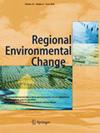Using social network analysis to track the evolution of Pacific food system research collaborations over time
IF 3.4
2区 环境科学与生态学
Q2 ENVIRONMENTAL SCIENCES
引用次数: 0
Abstract
Abstract Climate change undermines the foundations of food and nutrition security, making it crucial to understand and improve the current research collaborations striving to fill knowledge gaps about the impacts on food systems. This study focuses on the network of research actors working on food systems and climate change in Pacific Island Countries and Territories (PICTs), a region particularly vulnerable to climate change, and actively integrating knowledge about climate impacts to inform adaptation planning. Specifically, this study looks at co-publication as a form of research collaboration and co-production, using network analysis to understand who are the prominent organizational actors driving knowledge development in the region. Overall, we found a distinct core of these organizations engaged in the research space, dominated in number by academic institutions largely based in Australia, the USA, and New Zealand, but knit together through the interactions of the regional government agencies of the Pacific Islands. Over time, the network of research collaboration on climate change and food systems in the region has grown and diversified. While regional Pacific institutions have remained central actors throughout, national and subnational actors are still in the minority, raising questions about efforts to decolonize research in the region. Furthermore, greater interaction between peripheral actors and the core (especially Pacific actors) could help integrate new research into Pacific knowledge bases and decision-making. Ultimately, when facing the novel conditions that climate change brings, combining the infusion of new knowledge and innovation with local expertise and ownership is critical.利用社会网络分析跟踪太平洋粮食系统研究合作的演变
气候变化破坏了粮食和营养安全的基础,因此了解和改进当前努力填补有关气候变化对粮食系统影响的知识空白的研究合作变得至关重要。本研究的重点是太平洋岛屿国家和领土(PICTs)(一个特别容易受到气候变化影响的地区)的粮食系统和气候变化研究参与者网络,并积极整合有关气候影响的知识,为适应规划提供信息。具体而言,本研究将共同出版视为一种研究合作和共同生产的形式,使用网络分析来了解谁是推动该地区知识发展的主要组织参与者。总的来说,我们发现这些从事研究领域的组织有一个独特的核心,在数量上由主要位于澳大利亚、美国和新西兰的学术机构主导,但通过太平洋岛屿地区政府机构的互动联系在一起。随着时间的推移,该地区气候变化和粮食系统研究合作网络不断发展和多样化。虽然太平洋区域机构始终是中心行为体,但国家和次国家行为体仍然是少数,这对该区域非殖民化研究的努力提出了问题。此外,外围行为体和核心行为体(特别是太平洋行为体)之间更大的相互作用有助于将新的研究纳入太平洋的知识库和决策。最后,当面对气候变化带来的新情况时,将新知识和创新的注入与当地的专业知识和所有权相结合是至关重要的。
本文章由计算机程序翻译,如有差异,请以英文原文为准。
求助全文
约1分钟内获得全文
求助全文
来源期刊

Regional Environmental Change
环境科学-环境科学
CiteScore
6.80
自引率
2.40%
发文量
125
审稿时长
4.5 months
期刊介绍:
Environmental changes of many kinds are accelerating worldwide, posing significant challenges for humanity. Solutions are needed at the regional level, where physical features of the landscape, biological systems, and human institutions interact.
The goal of Regional Environmental Change is to publish scientific research and opinion papers that improve our understanding of the extent of these changes, their causes, their impacts on people, and the options for society to respond. "Regional" refers to the full range of scales between local and global, including regions defined by natural criteria, such as watersheds and ecosystems, and those defined by human activities, such as urban areas and their hinterlands.
We encourage submissions on interdisciplinary research across the natural sciences, social sciences and humanities, and on more focused studies that contribute towards the solutions to complex environmental problems. Topics addressed include (i) the regional manifestations of global change, especially the vulnerability of regions and sectors; (ii) the adaptation of social-ecological systems to environmental change in the context of sustainable development; and (iii) trans-boundary and cross-jurisdictional issues, legislative and governance frameworks, and the broad range of policy and management issues associated with building, maintaining and restoring robust social-ecological systems at regional scales.
The primary format of contributions are research articles, presenting new evidence from analyses of empirical data or else more theoretical investigations of regional environmental change. In addition to research articles, we also publish editorials, short communications, invited mini-reviews on topics of strong current interest, as well as special features that provide multifaceted discussion of complex topics or particular regions
 求助内容:
求助内容: 应助结果提醒方式:
应助结果提醒方式:


